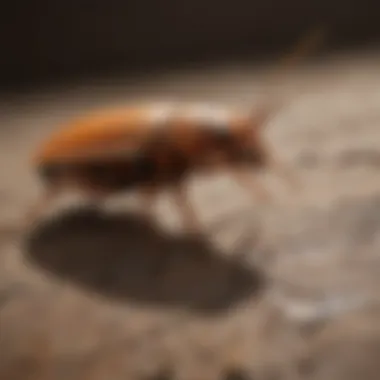Understanding Abilene Exterminators: Insights on Pest Control


Intro
Pest control is a critical topic for homeowners, particularly in places like Abilene where various pests create unique challenges. Understanding the dynamics of pests and the services provided by exterminators can help residents make informed decisions. This article will dive into the nuances of pest management, focusing on the role of exterminators, pest identification, effective prevention strategies, and eco-friendly solutions. It aims to equip homeowners with essential knowledge to tackle common pest issues effectively.
Understanding Pests
Definition of Pests
Pests are organisms that negatively impact human activities, whether by causing harm to structures, spreading diseases, or damaging crops. They can range from insects and rodents to unwanted plants, influencing both health and comfort in homes. Recognizing the definition of pests is the first step in managing them effectively.
Importance of Pest Identification
Identifying specific pests is crucial for several reasons. Different pests require unique treatment methods. Moreover, knowing what you’re dealing with can guide the selection of appropriate extermination services. Accurate identification also helps in understanding the pest’s habits and habitats, which is vital for effective control. It reduces the risk of misapplying treatments, thus saving time and resources.
"Understanding the specific needs of different pests is vital to effective management."
Prevention Techniques
Home and Garden Preventative Measures
Taking proactive steps to prevent pest infestations is essential. Here are several effective measures:
- Sealing Entry Points: Inspect windows, doors, and any cracks in walls or foundations to prevent access.
- Proper Waste Management: Store garbage in sealed containers and dispose of it regularly to reduce attractants.
- Maintaining Cleanliness: Regular cleaning eliminates food particles and debris, which attract pests.
- Landscaping Practices: Trim trees and bushes away from the home to deter nesting and entry for rodents and insects.
Seasonal Prevention Tips
Pest activity often varies with seasons. Here are some seasonal tips for Abilene:
- Spring: Check for signs of early pest activity. Sewage backups and moisture can attract pests.
- Summer: Decrease standing water around the home to prevent mosquitoes.
- Fall: Inspect your home as pests begin looking for warmth shelter. Ensure that all gaps and cracks are sealed.
- Winter: Improve insulation around pipes and walls to prevent rodents entering for warmth.
Eco-Friendly Pest Control Solutions
Overview of Sustainable Practices
All pest control practices should consider the environment. Sustainable methods focus on reducing harmful chemical usage, relying instead on approaches that are less damaging. Implementing Integrated Pest Management, or IPM, can effectively combine various strategies to manage pest populations while considering environmental impacts.
Natural Remedies and Their Effectiveness
Natural solutions can be surprisingly effective in managing pest problems. Some common natural remedies include:
- Diatomaceous Earth: This natural powder dehydrates insects that come into contact with it.
- Essential Oils: Oils like peppermint and neem have proven repellent properties.
- Beneficial Insects: Introducing predator pests, like ladybugs, can aid in controlling aphid populations naturally.
These approaches can be both practical and gentle on the environment, making them appealing options for many homeowners in Abilene. Understanding and weighing all approaches will help homeowners choose the right exterminator services for their specific needs.
The Importance of Exterminators
Pest control is a crucial aspect of maintaining a safe and healthy living environment. Exterminators play an important role in mitigating pest infestations, which can pose significant health risks and property damage. Understanding their importance begins with recognizing the complexities involved in pest management. Without professional assistance, homeowners may struggle to identify the underlying issues contributing to infestations.
Additionally, pest infestations can escalate quickly. Rodents and insects reproduce rapidly, making early intervention vital. Homeowners without the expertise often resort to temporary fixes, which can lead to ongoing problems. Exterminators provide targeted solutions that focus on eliminating the root cause. Their knowledge allows them to assess and tackle infestations more effectively than a general DIY approach.
Understanding Pest Infestations
A proper understanding of pest infestations encompasses various aspects, including their behavior, biology, and the conditions that lead to their presence. Different pests have distinct habits that influence their impact on homes. For instance, rodents often seek out food and shelter, which are commonly found in kitchens and attics. In contrast, insects like termites may not be visible until significant damage has occurred.
Homeowners should pay close attention to signs of infestations, such as droppings, gnaw marks, or unexplained holes. Recognizing these signs early helps in coordinating effective pest control strategies. Developments such as temperature and humidity levels within the home can also affect pest populations. An understanding of these factors equips homeowners to better protect their spaces.
Role of Exterminators in Pest Management
Exterminators occupy a pivotal position in pest management. They not only bring professional experience and technical knowledge but also the appropriate tools and products for treatment. Routine pest control services can facilitate preventive measures, reducing future infestations. These experts can assess the severity of an infestation and determine the best course of action.
Moreover, exterminators focus on integrated pest management, which combines various strategies to control pests sustainably. This includes monitoring, mechanical control, and, where necessary, chemical treatments. Exterminators also educate homeowners on best practices and preventive measures, promoting long-term pest control beyond their intervention.
In summary, the importance of exterminators cannot be overstated. They provide essential services that contribute significantly to the health and safety of homes. By understanding pest infestations and leveraging professional knowledge, homeowners can foster a pest-free environment.


Common Pests in Abilene
Understanding common pests in Abilene is crucial for homeowners and housewives alike. Pests can cause significant damage to properties and can lead to health risks. Knowing what pests are prevalent in this area helps residents take proactive measures. Moreover, differentiating between types of pests can help in choosing the right extermination methods. A well-informed household is better equipped to prevent infestation and maintain a healthier living environment.
Rodents
Rodents, including mice and rats, are among the most common pests in Abilene. They typically invade homes searching for food and shelter. Their presence can lead to structural damage, as they gnaw on wires, insulation, and wood. Additionally, rodents can pose health risks by spreading diseases through their droppings, urine, and saliva.
To prevent rodent infestations, homeowners should take key actions:
- Seal any openings or cracks on exterior walls.
- Store food in airtight containers.
- Keep the yard clean and free from debris.
Early detection is essential. Look for signs such as droppings, nests, or gnaw marks. If an infestation occurs, it's essential to contact a licensed exterminator.
Insects
Insects are widespread and can range from ants to bedbugs, each posing different challenges to homeowners. Ants often invade kitchens, seeking sugary foods, while bedbugs can hide in mattresses and upholstery, making them difficult to eradicate. Cockroaches can also become a problem, particularly in warmer months, as they thrive in the heat.
Effective management of insect infestations includes:
- Regularly cleaning and vacuuming the home.
- Addressing leaks or damp areas, which can attract pests.
- Utilizing traps or insecticides if necessary.
Understanding the lifecycle of these insects can help in choosing the correct treatment method. For instance, treating a bedbug issue requires targeting not just adult bugs but also their eggs.
Termites
Termites can be particularly destructive, often going unnoticed until substantial damage is done. These pests consume wood and can severely weaken a home's structure. In Abilene, subterranean termites are the most common species, often found underground.
Signs of termite infestations include:
- Mud tubes along walls or foundations.
- Hollow-sounding wood.
- Discarded wings near entry points.
To protect against termites, homeowners should:
- Schedule regular inspections by a qualified exterminator.
- Maintain a barrier between soil and wooden structures, avoiding direct contact.
- Reduce moisture around the foundation of the home.
If a termite infestation is confirmed, immediate action is necessary. Professional pest control services specializing in termite management will deploy treatments specific to the problem, potentially saving the homeowner significant repair costs.
Being proactive in identifying and managing pests can lead to a healthier home environment and save money in the long run.
Evaluating Exterminator Services
Evaluating exterminator services is a crucial step for homeowners looking to manage pest issues effectively. Choosing the right exterminator can significantly impact not just the immediate problem but also long-term pest management strategies. With many options available, discerning the quality of services offered requires careful consideration of several factors. This section explores essential elements in evaluating exterminator services, including certifications and licenses, experience and reputation, and cost considerations.
Certifications and Licenses
Certifications and licenses are fundamental indicators of a pest control service's legitimacy and professionalism. In Abilene, exterminators must comply with local and state regulations. Check the company’s credentials to ensure they are properly licensed to operate in your area. Valid licenses often mean both quality and safety standards are upheld during services.
It is wise to inquire whether the exterminator follows guidelines set forth by organizations such as the National Pest Management Association (NPMA). Such affiliations not only vouch for the exterminator's commitment to industry standards but often correlate with up-to-date training on the latest pest management techniques. Ensure you are not hiring an unlicensed professional, as this could lead to ineffective treatments or damage.
Experience and Reputation
Experience is another pivotal criterion in evaluating exterminator services. Companies with a long-standing presence in Abilene typically have a more robust understanding of local pest behavior, which can be invaluable in developing effective treatments. Consider asking prospective exterminators about their track record, success rates, or even case studies involving similar infestations.
Reputation within the community also serves as an important metric. Reviews and testimonials from past clients can provide insight into service quality and customer satisfaction. Look through platforms like Facebook or Reddit for feedback from local homeowners. This will offer a clearer picture of how well the company handles various scenarios and its overall reliability. It is advisable to choose a service that not only boasts experience but is also well-regarded by its clients.
Cost Considerations
When evaluating exterminator services, cost considerations play a critical role. Homeowners must balance affordability with quality. Obtain quotes from multiple companies to get a sense of the market rate in Abilene. Be cautious of prices that seem too low, as they may indicate subpar service or the use of ineffective methods.
Also, inquire about what the cost includes. Some companies may offer a comprehensive inspection as part of their package, while others may charge extra for this service. Look for transparency in pricing details. Knowing what you pay for helps avoid unexpected costs later. Understanding whether a flat rate applies or if charges depend on the infestation severity is essential.
In summary, when evaluating exterminator services, remember to emphasize certifications and licenses, assess experience and reputation, and carefully consider cost implications. These factors together will help you make an informed choice and ensure that your pest control needs are comprehensively addressed.


Pest Management Techniques
Pest management techniques are essential for maintaining a healthy environment, particularly in Abilene where specific pests are prevalent. Understanding these techniques enables homeowners to make informed decisions regarding pest control. These methods not only seek to remove or reduce pest populations but also focus on long-term solutions that minimize the risk of future infestations.
Effective pest management implicates careful assessment of the situation, which includes identifying the type of pest, its lifecycle, and the factors contributing to its presence. In this context, integrating various approaches can lead to more sustainable outcomes. Chemical treatments, Integrated Pest Management (IPM), and eco-friendly alternatives play critical roles in an effective pest control strategy.
Chemical Treatments
Chemical treatments involve the use of pesticides to eliminate pests. This method is commonly relied upon due to its effectiveness in quickly reducing pest populations. Pesticides come in various forms, such as sprays, baits, and granules, allowing for targeted applications based on the particular pest issue.
However, it is important to consider the types of chemicals used. Some can pose health risks to humans and pets if not applied correctly. Therefore, consulting with certified exterminators is advisable. They can assess the specific pest situation and recommend appropriate chemical solutions while taking safety precautions into account. When choosing chemical treatments, homeowners should be aware of:
- Proper application methods to ensure effectiveness
- Safety measures for family and pets
- Environmental impact of specific pesticides
Integrated Pest Management (IPM)
Integrated Pest Management, or IPM, represents a holistic approach to pest control. It combines technology, biological, cultural, and chemical practices to achieve better pest management. The goal of IPM is to minimize the use of hazardous chemicals while ensuring effective pest control.
By analyzing local pest populations, IPM emphasizes preventive measures and encourages cultural practices such as:
- Sanitation to remove food and shelter for pests
- Habitat modification to make environments less conducive to pest habitation
- Biological controls, such as encouraging natural predators of pests
IPM strategies are based on continuous monitoring and adaptive management. This approach not only reduces reliance on chemicals but also fosters an understanding of the pest ecosystem, resulting in a more sustainable pest management practice that aligns with homeowner preferences for safety and environmental health.
Eco-Friendly Alternatives
The rising awareness of environmental issues has led to a demand for eco-friendly pest control alternatives. These methods focus on less harmful substances and practices that are safe for both humans and pets. Eco-friendly pest control strategies often incorporate:
- Natural repellents such as essential oils, which can deter pests without toxic residues
- Organic pesticides, derived from natural materials, offering an effective solution with fewer side effects
- Mechanical traps, which provide non-chemical means to manage pest populations effectively
Applying eco-friendly approaches requires an understanding of pest behavior and effective use of natural deterrents. Homeowners are increasingly attracted to these methods, aligning pest control with broader environmental goals.
"Eco-friendly pest control not only protects our homes but also safeguards our planet for future generations."
In summary, choosing the right pest management techniques is crucial for homeowners in Abilene. By understanding chemical treatments, adopting Integrated Pest Management, and exploring eco-friendly alternatives, a thorough approach to pest control can be established, leading to healthier living conditions.
Preventative Measures for Homeowners
Preventative measures for homeowners play a crucial role in maintaining a pest-free environment. They are the first line of defense against infestations that can disrupt lives and damage property. By implementing effective preventative strategies, homeowners can significantly reduce the likelihood of pests invading their space. This focus not only enhances comfort but also alleviates potential health risks associated with pests.
Regular Inspections
Regular inspections are essential for identifying potential pest problems before they escalate. Conducting routine checks in the home and surrounding areas helps remain vigilant against infestations. Homeowners should look for signs of pests, such as droppings, nests, or damage to property.
- Frequency: Ideally, inspections should happen quarterly. However, if you reside in areas prone to specific pests, increasing the frequency may be wise.
- Key Areas to Inspect: Check basements, attics, and any storage spaces. The kitchen is also a significant area due to food attractiveness.
By keeping a proactive approach, homeowners can catch infestations early, limiting the need for extensive extermination services later.
Home Maintenance Tips
Home maintenance is another effective strategy in pest prevention. A well-maintained home minimizes entry points and reduces conducive conditions for pests to thrive. Simple repairs can make a significant difference.
- Seal Cracks and Gaps: All potential entry points for pests, including cracks in walls and gaps around doors and windows, should be sealed. Use caulking or expanding foam to close these openings.
- Proper Waste Management: Store trash in sealed containers. Keeping waste in controlled areas deters pests from seeking food sources.
- Cleanliness: Regular cleaning, especially in kitchens and dining areas, can prevent food residues that attract pests. This includes wiping down surfaces and vacuuming regularly.
Establishing a routine for home maintenance can create an unfavorable environment for pests, ultimately leading to long-term pest management success.
Landscaping Considerations
The exterior of a home is equally important in driving pest prevention strategies. Landscaping plays a significant role in the first impression of a pest's potential habitat.
- Trimming Vegetation: Keep shrubs and trees well-trimmed and away from the house. Vegetation that comes into close contact with your house can provide pathways for pests.
- Mulch Management: Use mulch sparingly and ensure it does not touch the structure of your home. Pest insects commonly dwell in the mulch, especially if it is piled up against the exterior walls.
- Water Management: Ensure water does not accumulate around the foundation of the house. Standing water can attract unwanted pests, such as mosquitoes.
Through careful landscaping, homeowners can deter pests and promote a healthy balance around their properties.


Effective preventative measures require consistent effort. They form the basis for a healthy living environment and a resistant home against infestations.
Responding to Infestations
Addressing pest infestations promptly is crucial for homeowners in Abilene. A timely response not only mitigates damage but also protects health and safety. Pests can introduce allergens and diseases into the home, making awareness of early signs critical. Understanding how to act when an infestation occurs can help maintain a safe living environment. Below, two key areas of this topic are discussed: signs to watch for and the necessary immediate actions to take.
Signs of Infestation
Recognizing an infestation quickly can prevent a minor issue from becoming a major problem. Some common indicators include:
- Droppings: Finding fecal matter around the house can signal the presence of rodents, insects, or other pests.
- Gnaw marks: Rodents tend to chew on wires, wood, or plastic, leaving noticeable marks.
- Nests or burrows: Look for nests made from shredded materials like paper or fabric in less visible areas.
- Unusual odors: A musty or strong smell often indicates an infestation, particularly with rodents or decaying insect bodies.
- Sound: Scratching noises at night can point to rodents in the walls or attics.
Dirty workspaces or unclosed food items can exacerbate pest issues. Keeping an ear out for noise and a watch on clean surroundings is key to early detection.
Immediate Actions to Take
Once signs of infestation are observed, immediate actions should be taken. Here are some initial steps to consider:
- Identify the pest: Understanding which pest you are dealing with can help in choosing the right method of control.
- Contain the area: Keep children and pets away from the affected area to prevent potentially harmful contacts with pests or pest control substances.
- Eliminate food sources: Store food in sealed containers, clean crumbs, and spills to discourage pests from returning.
- Seal entry points: Inspect your home for cracks, holes, or openings where pests may enter, and seal these off to limit access.
- Consult professionals: If the infestation appears severe or difficult to manage, contacting a qualified exterminator in Abilene can provide effective solutions.
"Prompt and decisive action can prevent an infestation from escalating, protecting both the property and health of its inhabitants."
In summary, being alert to signs of infestation and knowing the immediate steps to take can significantly impact the management of pest issues in your home. These actions will help reduce stress and create a more comfortable living space.
Regulatory Framework and Standards
When discussing pest control in Abilene, it is important to understand the regulatory framework and standards that govern exterminator practices. This framework ensures that pest management is conducted legally and ethically. Without these regulations, pest control could lead to ineffective practices, potential harm to the environment, and violations of health codes.
The regulations govern various aspects of pest control, including the types of chemicals used, the methods of application, and the licensing requirements for pest control professionals. These aspects ensure that exterminators maintain a certain level of expertise and adhere to safe practices that minimize risks to both the public and the environment.
Local Regulations on Pest Control
Local regulations in Abilene have been established to protect residents from harmful pest management practices. Firstly, exterminators must be licensed, which requires them to complete training and pass tests on pest control methods and safety protocols. This licensing provides homeowners with assurance that the exterminator possesses the necessary knowledge.
Moreover, these regulations dictate how and when certain chemicals can be used. For instance, some pesticides may only be applied during specific times or in designated areas to prevent contamination of water supplies or harm to local wildlife. Compliance with these regulations not only protects residents but also ensures the sustainability of local ecosystems.
Environmental Considerations
The impact of pest control on the environment cannot be overlooked. Regulations aim to mitigate these effects by promoting environmentally-friendly practices. Exterminators in Abilene are encouraged to use Integrated Pest Management (IPM) techniques. IPM focuses on minimizing pesticide use while effectively managing pest populations. This approach balances pest control with environmental stewardship.
When exterminators follow these environmental guidelines, they contribute to a healthier community. Less reliance on harmful chemicals means reduced risk of pollution and safer habitats for beneficial organisms.
"Sustainable pest management practices are essential for preserving the delicate balance of local ecosystems."
Consumer Awareness and Education
Consumer awareness in pest control services is essential for homeowners. Many people do not fully understand the complexities of pest control. Without proper knowledge, individuals may make uninformed decisions that lead to ineffective pest management or even hazardous situations. Raising awareness offers numerous benefits. It helps homeowners recognize the signs of a pest problem, understand the importance of professional services, and choose the right exterminator.
Identifying Reliable Exterminators
Identifying a reliable exterminator in Abilene involves several key aspects. First, check for licensing and certification. Valid licenses ensure that the exterminator has undergone the necessary training and understands local regulations. You can usually find this information on state or local government websites.
Next, consider their experience. An exterminator with years of servicing Abilene will have dealt with the pests specific to this area and will bring valuable knowledge. Look for online reviews or ask for references to gauge their reputation.
Finally, ensure that they offer a variety of services. Some pests require specific treatments. A reliable exterminator should have the expertise in multiple methods, including chemical treatments, traps, and eco-friendly options. This variety is crucial in addressing the unique challenges posed by pests in your home.
Help Sections about Pest Control Services
1. How often should I have my home treated for pests?
Frequency depends on the type of pests and your location. Many recommend an annual inspection and treatment as needed.
2. What should I do before an exterminator arrives?
Clear areas to be treated. Move furniture and belongings. Discuss any concerns or areas of infestation with the exterminator.
3. Are pest control chemicals safe for my family and pets?
Reputable exterminators use regulated products and can explain safety measures. Ask them about the products they use before treatment.
4. Can I prevent pests without professional help?
Yes, basic home maintenance like sealing cracks, proper food storage, and regular cleaning can significantly reduce pest problems.
5. What should I expect after treatment?
Depending on the pest, you may see activity for a short time after treatment. Your exterminator will provide guidance on follow-up care.
"Consumer education empowers homeowners to make informed choices about pest control, directly impacting the effectiveness of treatment and safety of their environment."



